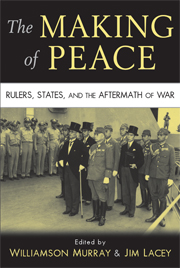Book contents
- Frontmatter
- Contents
- Preface: concluding peace
- 1 Introduction: searching for peace
- 2 The Peace of Nicias
- 3 “A swift and sure peace”: the Congress of Westphalia 1643–1648
- 4 The Peace of Paris, 1763
- 5 In search of military repose: the Congress of Vienna and the making of peace
- 6 War and peace in the post–Civil War South
- 7 Vae victoribus: Bismarck's quest for peace in the Franco-Prussian War, 1870–1871
- 8 Versailles: the peace without a chance
- 9 “Building buffers and filling vacuums”: Great Britain and the Middle East, 1914–1922
- 10 Mission improbable, fear, culture, and interest: peace making, 1943–1949
- 11 The economic making of peace
- 12 Ending the Cold War
- 13 Conclusion: history and the making of peace
- Index
- References
8 - Versailles: the peace without a chance
Published online by Cambridge University Press: 05 June 2012
- Frontmatter
- Contents
- Preface: concluding peace
- 1 Introduction: searching for peace
- 2 The Peace of Nicias
- 3 “A swift and sure peace”: the Congress of Westphalia 1643–1648
- 4 The Peace of Paris, 1763
- 5 In search of military repose: the Congress of Vienna and the making of peace
- 6 War and peace in the post–Civil War South
- 7 Vae victoribus: Bismarck's quest for peace in the Franco-Prussian War, 1870–1871
- 8 Versailles: the peace without a chance
- 9 “Building buffers and filling vacuums”: Great Britain and the Middle East, 1914–1922
- 10 Mission improbable, fear, culture, and interest: peace making, 1943–1949
- 11 The economic making of peace
- 12 Ending the Cold War
- 13 Conclusion: history and the making of peace
- Index
- References
Summary
The Treaty of Versailles: The very words resonate with failure – a disastrous peace that supposedly enabled another catastrophic war within two decades. As the French Field Marshal Ferdinand Foch morosely commented at the Treaty's signing: “This is not a peace; it is an armistice for twenty years.” Even more presciently he later noted: “The next time, remember, the Germans will make no mistakes. They will break through northern France and seize the Channel ports as a base of operations against England.” It is not surprising that historians have blamed the statesmen who negotiated and debated at Versailles for the all too obvious collapse of the European order in the 1930s.
Yet, as always in history, it is the context that matters. In the end, it was not the Treaty of Versailles that made another major European war inevitable but rather the strategic, political, and military circumstances of the war and its sudden ending that not only drove the politicians at Versailles but largely determined the success or failure of the peace in the long term. Moreover, the policies and decisions crafted by the statesmen, politicians, diplomats, and events themselves in the aftermath of Versailles would guide Europe and the peace in very different directions from what the peacemakers of 1919 had hoped.
Historians have also tended to argue that those who framed the Treaty of Versailles had a choice among three alternatives: a liberal peace of reconciliation, a peace of revenge to pay the Germans back for their actions during the conflict, and the peace that eventually ensued, one that fell between the stools of reconciliation and revanche.
- Type
- Chapter
- Information
- The Making of PeaceRulers, States, and the Aftermath of War, pp. 208 - 239Publisher: Cambridge University PressPrint publication year: 2008
References
- 2
- Cited by



